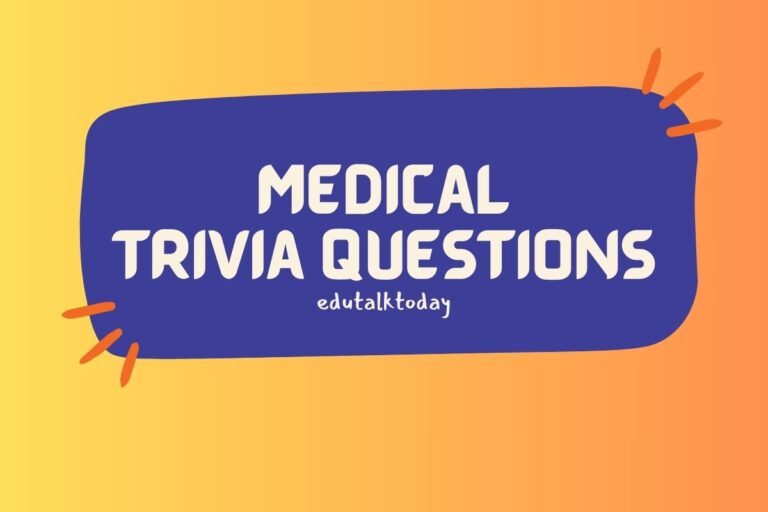24 Immune System Trivia Questions

Are you ready to put your immune system knowledge to the test?
Whether you’re a health enthusiast, a biology buff, or just curious about how your body fights off infections, these trivia questions will challenge and educate you about the fascinating world of immunity.
So, grab a pen and paper, or simply keep track of your answers in your mind, as you embark on this journey through the defenses of the human body.
Let’s go.
Immune System Trivia Questions
- What is the primary difference between the innate and adaptive immune systems in terms of response time and specificity?
- Name the type of white blood cell that is primarily responsible for the production of antibodies.
- What is the term for the small proteins released by cells that have antiviral properties and can alert neighboring cells to a viral presence?
- Which organ is responsible for the maturation of T lymphocytes, a crucial component of the adaptive immune response?
- Identify the process by which certain immune cells present fragments of pathogens (antigens) on their surface to initiate a specific immune response.
- What is the name of the phenomenon where the body’s immune system mistakenly targets and attacks its own tissues and organs?
- Which class of antibodies is the first to increase in response to an initial infection?
- Name the unique type of lymphocyte that can directly kill virus-infected cells and tumor cells without the need for antibodies.
- What is the term for the region of the antibody that binds to an antigen?
- Explain the role of the complement system in the immune response.
- What is the primary function of Major Histocompatibility Complex (MHC) molecules in the immune response?
- Identify the term used to describe a small molecule that, when combined with a larger carrier such as a protein, can elicit an immune response.
- Which specific type of T cell is essential for the activation of other immune cells, including B cells and cytotoxic T cells?
- What is the mechanism by which antibodies neutralize pathogens?
- Name the primary lymphoid organ where B lymphocytes mature.
- What type of immunity is conferred when a person is vaccinated against a disease?
- Which enzyme is crucial for the rearrangement of antigen receptor genes in B and T cells, enabling the diversity of the adaptive immune response?
- What is the name of the process where macrophages and dendritic cells consume pathogens and then present their antigens on their surface?
- Which subset of T cells suppresses the immune response to maintain tolerance to self-antigens and prevent autoimmune disease?
- Name the disorder characterized by a deficiency of the C1 inhibitor protein, leading to excessive activation of the complement system and recurrent episodes of swelling.
- What is the primary role of chemokines in the immune system?
- Identify the area in secondary lymphoid organs where B cells undergo proliferation and differentiation in response to antigen exposure.
- Which immunoglobulin class is primarily found in mucous membranes and body secretions, playing a key role in mucosal immunity?
- Name the autoimmune disease characterized by the production of autoantibodies against acetylcholine receptors, leading to muscle weakness.
Answers
- The innate immune system responds quickly and non-specifically to pathogens, whereas the adaptive immune system responds more slowly but with high specificity to each unique pathogen.
- B lymphocytes (B cells) are primarily responsible for the production of antibodies.
- Interferons are the small proteins that have antiviral properties and can alert neighboring cells to a viral presence.
- The thymus is the organ responsible for the maturation of T lymphocytes.
- Antigen presentation is the process by which immune cells present fragments of pathogens on their surface to initiate a specific immune response.
- Autoimmunity is the phenomenon where the body’s immune system mistakenly targets and attacks its own tissues and organs.
- IgM (Immunoglobulin M) is the class of antibodies that is the first to increase in response to an initial infection.
- Natural Killer (NK) cells are the unique type of lymphocyte that can directly kill virus-infected cells and tumor cells without the need for antibodies.
- The variable region is the term for the region of the antibody that binds to an antigen.
- The complement system plays a role in the immune response by marking pathogens for destruction (opsonization), directly killing pathogens via the formation of membrane attack complexes, and enhancing the inflammatory response.
- MHC molecules present peptide fragments of proteins from pathogens to T cells, facilitating their recognition and the immune response.
- Hapten is the term for a small molecule that can elicit an immune response when combined with a larger carrier.
- Helper T cells (CD4+ T cells) are essential for the activation of other immune cells.
- Antibodies neutralize pathogens by binding to them, blocking their attachment to host cells, and marking them for destruction by other immune cells.
- The bone marrow is the primary lymphoid organ where B lymphocytes mature.
- Vaccination confers active artificial immunity.
- RAG (Recombination Activating Gene) enzyme is crucial for the rearrangement of antigen receptor genes.
- Phagocytosis is the process where macrophages and dendritic cells consume pathogens and present their antigens on their surface.
- Regulatory T cells (Tregs) suppress the immune response to maintain tolerance to self-antigens.
- Hereditary angioedema is the disorder characterized by a deficiency of the C1 inhibitor protein.
- Chemokines primarily direct the movement of immune cells towards sites of infection, inflammation, or injury.
- Germinal centers in secondary lymphoid organs are where B cells proliferate and differentiate in response to antigen exposure.
- IgA (Immunoglobulin A) is primarily found in mucous membranes and body secretions.
- Myasthenia gravis is characterized by the production of autoantibodies against acetylcholine receptors, leading to muscle weakness.





